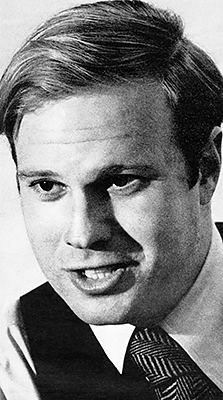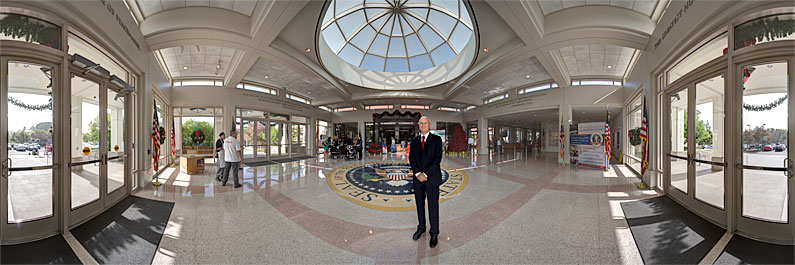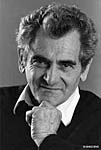Jeff Donfeld – "Nixon's Youth Corps"
|
Jeff Donfeld in his West Los Angeles office. Photo by Bill Ganzel, December 2012.
|
|
Jeff Donfeld, 26, got to know President Richard Nixon when he took "a summer job with Mr. Nixon's New York law firm between his junion and senior years at law school on the University of California's roiling Berkeley campus... During last November's anti-war marches, Donfeld worked to keep the demonstration nonviolent." Photo by Stanley Tretick, from the February 2, 1970, edition of LOOK. |

|
|
|
In February 1970, LOOK profiled 12 staff members serving in President Nixon’s White House. Jeff Donfeld was the second person profiled. He grew up with a Democratic mother and a Republican father – "One of the few Jewish Republicans around." Donfeld is proud of the fact that, "I've never been high in my life... Starting in the 60s, America witnessed a moral deterioration. We became a feel-good society... Drug use was prevalent because it was OK in that culture. So long as American feel they are entitled to feel good, to mask whatever emotional distress they're experiencing by artificial means, I don’t think that bodes well for the future of our country." So, it may be no surprise that he chose to work on drug policies in the White House. He saw baby boomers around him experimenting with drugs and addicts contributing to an explosion in crime. "At this point in American history," Donfeld says, "crime was foremost in the minds of the American public. I think crime and the Vietnam War. And there was definitely a correlation between heroin addiction and crime. I thought if I could find a way to interdict that cycle, I would be helping both those who were addicted and be benefiting the country as well." He discovered research that suggested that treatment of the underlying causes of addiction could be effective in reducing crime among addicts. The new drug law that Donfeld worked on emphasized treatment of addicts. "There was compassion," he asserts. "It wasn't 'Lock them up!' It was, 'Help them!'" Donfeld credits his mother for some of that attitude. "Maybe it was because of my mother, Katie Donfeld... She volunteered at mental health hospitals. She was a very giving person. She always cared for those who had less." The drug policy office that Donfeld worked on actually gave grants to Dr. David Smith’s Haight Ashbury Free Clinic in the 70s. Those grants helped keep the clinic open. Donfeld says, "This is one of the great secrets of the universe – the Nixon administration was really a liberal administration." He says you can see that in Nixon's creation of the Environmental Protection Agency (EPA), his foreign policy overtures to China, and the drug laws Donfeld worked on. |
|
Crime and Vietnam were major issues of the 60s to Donfeld, and he believed in the domino effect – if Vietnam fell to the Communists, other countries is Asia would, too. "That was a frightening time for America," he says, "where nuclear warfare was something that the world was concerned with. I still remember ducking under desks as a kid for drills. So the threat of nuclear warfare was real. The Berlin Wall was a reality. Communism seemed to be spreading... There was the Korean War. These were realities! It's fine to sit back today and say, 'Well, how could you have thought that way when the Soviet Union is no longer. It collapsed.' That’s wonderful. You now have 20-20 hindsight." Donfeld's work with drug policy was extended to soldiers in Vietnam. It was obvious that more and more soldiers were returning addicted to heroin. Donfeld and Dr. Jerome Jaffe introduced the Pentagon to the first small urine analysis machines. "The word spread – if there was heroin in your urine, your departure back to the United States could be delayed. That was a great deterrent to the soldiers." Donfeld became responsible for the military's drug program. "We set up treatment programs throughout the world, really, at VA facilities and military installations. Again, so it wouldn't be a punitive process but a therapeutic process where we would help these guys." Earlier, Donfeld had been student body president at UCLA, and became friends with David Mixner, one of the national coordinators of the Vietnam Moratorium Committee. During some of the 1969 anti-war marches, Donfeld and Mixner worked together to keep the demonstration nonviolent. He also gained some notoriety because he dated President Nixon's daughter Tricia. But that's an experience he calmly refuses to talk about. Donfeld notes that some critics accuse Nixon of being anti-Semetic. "But if he were anti-Semitic," he says, "would he have allowed me to date Tricia?" Donfeld became disillusioned and left Washington after the Watergate scandal. He went into private law and now has a thriving practice in real estate law in California. He is proud of his house in Malibu. |

|
|||





